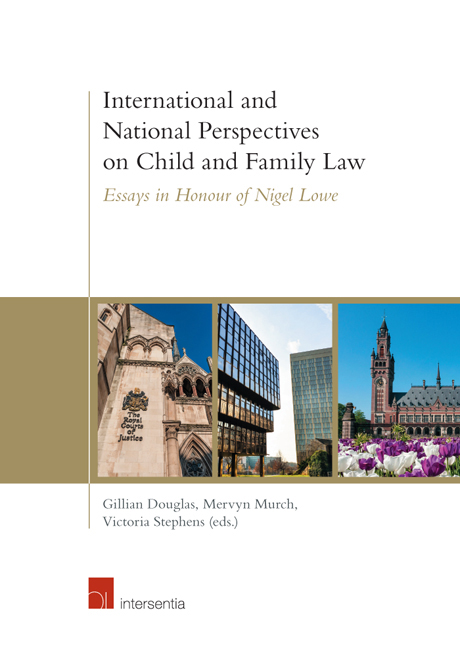Book contents
- Frontmatter
- Foreword
- Acknowledgements
- Contents
- List of Cases
- List of Contributors
- Introduction: Nigel Vaughan Lowe: An Appreciation
- Part I Family and Child Law in England and Wales
- Part II International Family Law
- Judging Parental Child Abduction: What Does it Mean to Adopt a Children's Rights-Based Approach?
- Judicial Activism: A 20-Year Evolution
- Globalisation of Adjudication in International Family Law: Serving International Families by Producing International Solutions
- Creating International Families: Private International Law and the Industry of Parenthood
- Issues in International Divorce Cases
- Non-Judicial Divorce in France: Progress or a Mess?
- The Istanbul Convention: Is Domestic Abuse Violence Against Women?
- Nationality and Migration Status in International Children's Law
- The Development of Child Protection Across International Borders for Children at Risk of Harm
- Nigel Lowe and International Family Law: An Immense Contribution
- The Spanish Constitutional Court and Protracted Child Abduction Proceedings: Time is of the Essence
- Non-Recognition of Child Marriages: Sacrificing the Global for the Local in the Aft ermath of the 2015 ‘Refugee Crisis’
- Juvenile Justice in Bulgaria: Reforms and Resistance
- Overriding Mandatory Provisions in EU Family Law Regulations
- Part III The Future for Family and Child Law
The Istanbul Convention: Is Domestic Abuse Violence Against Women?
from Part II - International Family Law
Published online by Cambridge University Press: 12 October 2018
- Frontmatter
- Foreword
- Acknowledgements
- Contents
- List of Cases
- List of Contributors
- Introduction: Nigel Vaughan Lowe: An Appreciation
- Part I Family and Child Law in England and Wales
- Part II International Family Law
- Judging Parental Child Abduction: What Does it Mean to Adopt a Children's Rights-Based Approach?
- Judicial Activism: A 20-Year Evolution
- Globalisation of Adjudication in International Family Law: Serving International Families by Producing International Solutions
- Creating International Families: Private International Law and the Industry of Parenthood
- Issues in International Divorce Cases
- Non-Judicial Divorce in France: Progress or a Mess?
- The Istanbul Convention: Is Domestic Abuse Violence Against Women?
- Nationality and Migration Status in International Children's Law
- The Development of Child Protection Across International Borders for Children at Risk of Harm
- Nigel Lowe and International Family Law: An Immense Contribution
- The Spanish Constitutional Court and Protracted Child Abduction Proceedings: Time is of the Essence
- Non-Recognition of Child Marriages: Sacrificing the Global for the Local in the Aft ermath of the 2015 ‘Refugee Crisis’
- Juvenile Justice in Bulgaria: Reforms and Resistance
- Overriding Mandatory Provisions in EU Family Law Regulations
- Part III The Future for Family and Child Law
Summary
INTRODUCTION
Nigel Lowe and International Family Law have gone together, well, rather better than love and marriage, for many decades. Family lawyers know that if you have a tricky question on international family law Nigel is the person to ask. The depth of his knowledge, the warmth of his support, the gentleness of his spirit, and his passion for the subject are an inspiration to all.
Recent international human rights instruments have recognised the category of Violence against Women (VAW). Most notable is the UN Declaration on the Elimination of Violence Against Women. The VAW approach emphasises that women are subject to violence in a range of contexts and that this should be understood as having especial significance because it is against women. Feminist scholars see VAW as a key aspect of patriarchy. This chapter focuses on one particular question which has arisen for European family lawyers and that is whether it is helpful to see domestic abuse as VAW.
The focus of this discussion will be the Istanbul Convention, which plays a major role in the European response to crimes against women. In this chapter I will criticise the Convention for separating out domestic abuse from VAW. I will argue that this masks a crucial aspect of domestic abuse: that it contributes to patriarchy.
Of course, in saying this I am not for a moment denying that within intimate relationships women are violent to women; that women are violent to men; or that men are violent to other men. But I will argue that in some of these cases that violence lacks the patriarchy-supporting dimension that needs to be recognised. That dimension is downplayed by grouping all violence within intimate relationships into a single category.
This chapter will start with a description of the definition of domestic abuse in the Istanbul Convention and will clarify the issue being discussed. It will then explore why it is important that domestic violence is explained as VAW, before looking at the difficulties in doing so.
THE ISTANBUL CONVENTION
The Istanbul Convention draws together European legal policies on violence against women. I will not seek to set out all the terms of the Convention. There is much that is admirable and helpful in it. My focus is on its gender-neutral definition of domestic abuse.
- Type
- Chapter
- Information
- International and National Perspectives on Child and Family LawEssays in Honour of Nigel Lowe, pp. 205 - 218Publisher: IntersentiaPrint publication year: 2018



